Irinotecan is made from the Chinese ornamental tree “Camptotheca acuminata”. It is classified as a plant alkaloid.
Irinotecan is used for colon cancer, small cell lung cancer, and pancreatic cancer. It can be used alone or in combination.
The usual form of application is the slow injection into a vein. It can cause inflammation of the vein and severe tissue damage when falsely injected outside the vein.

Embed this Infographic on your site:
<a href='https://dr-adem.com/increase-efficacy-of-irinotecan/'><img src='https://dr-adem.com/wp-content/uploads/2019/10/irinotecan-how-to-improve-the-efficacy.jpg' alt='Increase Efficacy Of Irinotecan'/></a>Common side effects are:
- Diarrhea
- Nausea and vomiting
- Weakness
- Low white blood cell count, which can lead to infections
- Anemia (low red blood count)
Irinotecan-associated “late” diarrhea can result in severe dehydration requiring hospitalization or intensive care unit admission. Please contact the doctor immediately if antidiarrheals such as loperamide do not help quickly.
In contrast to this “late” diarrhea, there is also the “early” type. It starts immediately, typical are parallel symptoms such as runny nose, increased saliva, watery eyes, sweating, stomach cramps, or flushing.
Due to the side effects, old people need special observation when taking Irinotecan.
Irinotecan should not be used if you have certain medical conditions. Please consult your doctor or pharmacist if you have:
- bowel blockage (e.g., paralytic ileus)
- certain genetic metabolism disorder (fructose intolerance)
- blood/bone marrow disorders
- diabetes
- liver disease
- kidney disease
- lung disease
Prevent pregnancy if you have to use Irinotecan. Avoid breastfeeding because it is still not known if the drug passes into breast milk.



